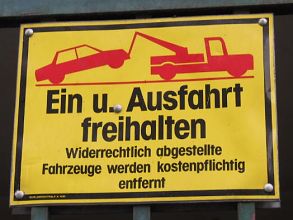Verbs: the Passive
| What is it? | Why?
| How to: Present Tense | How
to: Imperfect Tense | How to: Perfect
Tense | Other Options |
| Things to Watch Out For |
How to use the Passive - Things to Watch Out For
1) Dative objects
Some verbs like danken, helfen and folgen have Dative objects.
E.g. ACTIVE ![]() Meine Schwester hilft dem Mann.
Meine Schwester hilft dem Mann.
These Dative objects have to stay Dative in the Passive, they can't go Nominative!
PASSIVE ![]() Dem Mann wird von meiner Schwester geholfen. (The man
is being helped by my sister.)
Dem Mann wird von meiner Schwester geholfen. (The man
is being helped by my sister.)
2) There is an impersonal form of the Passive with "es" as subject of the sentence.
Es wurde auf der Party viel getanzt. (There was a lot of dancing at the party.)
3) Watch out for the difference between when you want to refer to an action (use Passive) and when you want to describe a situation/state (sein + past participle)
Action: PASSIVE ![]() Das Fahrrad wird jetzt repariert. (The bike is being repaired
now.)
Das Fahrrad wird jetzt repariert. (The bike is being repaired
now.)
Situation: sein + participle ![]() Das Fahrrad ist jetzt repariert. (The bike is fixed now.)
Das Fahrrad ist jetzt repariert. (The bike is fixed now.)
